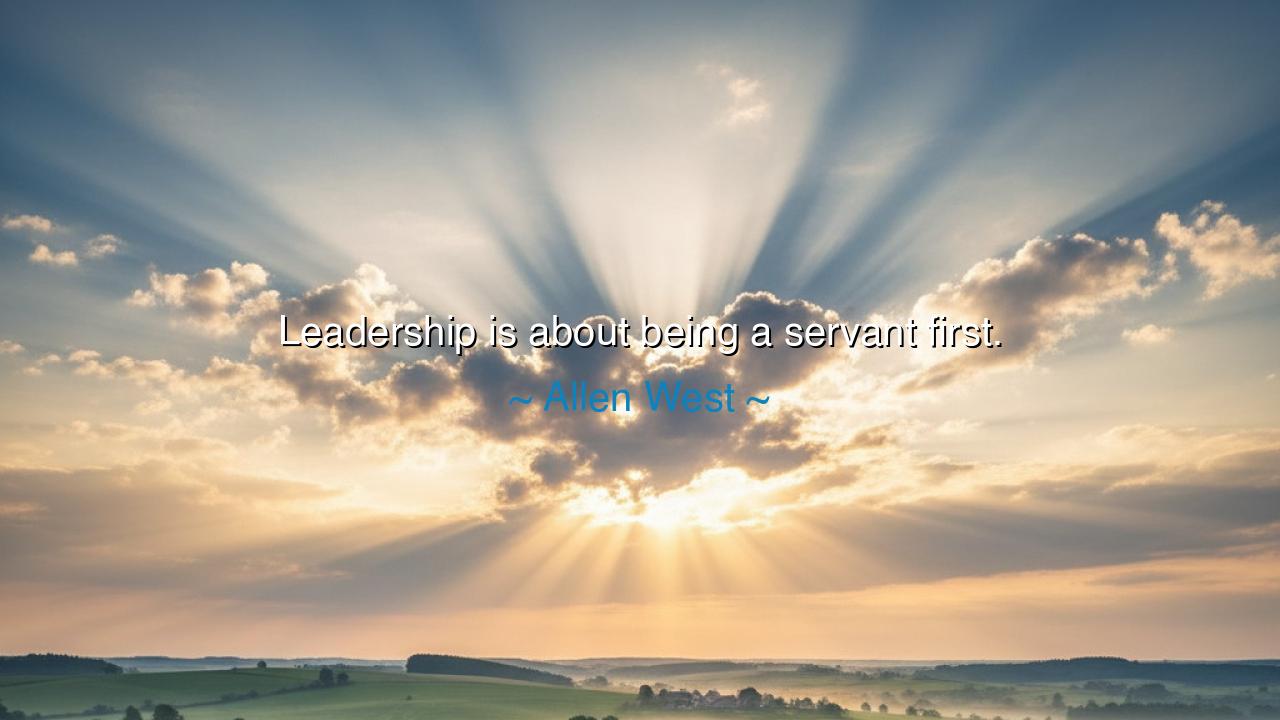
Leadership is about being a servant first.






Hear now, O children of wisdom, the words of Allen West, who declared: “Leadership is about being a servant first.” In this brief utterance lies a truth vast as the mountains and enduring as the seas. Too often men mistake leadership for power, for dominion, for the right to command. Yet the ancients, and the wise of every age, know that true greatness is found not in ruling over others, but in serving them with humility, courage, and love. The crown of the leader is not made of gold, but of sacrifice.
To lead is to kneel before one’s people, to bind their wounds, to lift their burdens, and to give of one’s strength that others may stand taller. The servant-leader does not ask, “What can they do for me?” but instead, “What may I do for them?” In this way, leadership is transformed from a hunger for authority into an offering of the heart. The shepherd who lays down his comfort to guard the flock from wolves, the captain who remains last to abandon a sinking ship—these are the images that reveal the essence of the servant-leader.
Consider, for example, the life of George Washington, who might have crowned himself king after victory in the American Revolution, for the people adored him and the army would have followed him without hesitation. Yet he refused the temptation of absolute power, choosing instead to serve as a humble president, accountable to the people and bound by the laws of the land. In that act of restraint and service, Washington etched into history the model of servant leadership: the leader who gives up glory for the good of the nation.
The wisdom of this teaching may also be seen in the story of Mahatma Gandhi, who clothed himself not in silks but in simple cloth, walking among his people barefoot and unarmed. Though he bore no sword, he became the general of a mighty movement, leading millions toward freedom by first becoming their servant. He cleaned latrines, spun thread, and dwelt among the poor. By lowering himself, he lifted an entire nation. Here is the power of servant first: to lead by example, to inspire not by command, but by selflessness.
Yet beware, for false leaders arise in every age—those who cloak themselves in fine words but seek only to enrich their own houses. They are like shepherds who feed upon the sheep, kings who devour the harvest while their people starve. Such men may rise swiftly, but their fall is swifter still, for a house built upon pride cannot endure. Only the leader who serves builds upon stone; all others build upon sand.
What, then, is the lesson for us who walk in humbler paths? It is this: in whatever sphere you find yourself—be it in family, in work, in community—embrace service before seeking control. Ask how you might ease the labor of others, how you might guide with patience rather than with force, how you might offer your time, your care, your knowledge, as gifts rather than weapons. For the servant heart, when lifted to a place of authority, rules not by fear but by love.
Practical action lies before you: volunteer where there is need, listen before you speak, put the well-being of those around you above your own ambition. In these small acts, you become a servant, and by being a servant, you are prepared to lead. Whether or not the world crowns you as a leader, you will already possess the noblest form of leadership—the one that begins with humility and ends with honor.
Thus remember, O future generations: the mightiest leader is the lowest servant, and the lowest servant, when faithful, becomes the mightiest leader. To serve is to lead, and to lead is to serve. This is the eternal circle of wisdom, and in it shines the everlasting truth of Allen West’s words.






AAdministratorAdministrator
Welcome, honored guests. Please leave a comment, we will respond soon